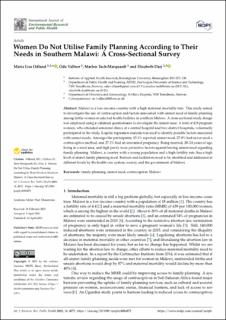Women do not utilise family planning according to their needs in southern Malawi: A cross-sectional survey
Peer reviewed, Journal article
Published version

Åpne
Permanent lenke
https://hdl.handle.net/11250/3035803Utgivelsesdato
2021Metadata
Vis full innførselSamlinger
Originalversjon
International Journal of Environmental Research and Public Health (IJERPH). 2021, 18 (8), 1-10. 10.3390/ijerph18084072Sammendrag
Malawi is a low-income country with a high maternal mortality rate. This study aimed to investigate the use of contraception and factors associated with unmet need of family planning among fertile women in selected health facilities in southern Malawi. A cross-sectional study design was employed using a validated questionnaire to investigate the unmet need. A total of 419 pregnant women, who attended antenatal clinics at a central hospital and two district hospitals, voluntarily participated in the study. Logistic regression analysis was used to identify possible factors associated with unmet needs. Amongst the participants, 15.1% reported unmet need, 27.0% had never used a contraceptive method, and 27.2% had an unwanted pregnancy. Being married, 20–24 years of age, living in a rural area, and high parity were protective factors against having unmet need regarding family planning. Malawi, a country with a young population and a high fertility rate, has a high level of unmet family planning need. Barriers and facilitators need to be identified and addressed at different levels by the health care system, society, and the government of Malawi.
